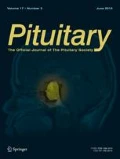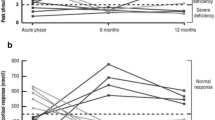Abstract
Traumatic brain injury (TBI) was traditionally considered an infrequent cause of hypopituitarism. However recent reports strongly suggest that TBI-mediated pituitary hormones deficiency may well be more frequent than previously thought. As the prevalence of hypopituitarism is not dependent on the severity of the trauma and considering the high number of TBI events in all industrialized countries a screening procedure for detecting hormone deficiencies in all TBI patients is not possible. In the present work a suggestion for screening a subgroup of TBI patients is discussed in order to increase the effectiveness of the whole procedure.
Similar content being viewed by others
References
Escamilla RF, Lisser H. Simmonds disease. J Clin Endocrinol 1942;2:65–96.
Porter RJ, Miller RA. Diabetes Insipidus following closed head injury. J Neurol Neurosurg Psychiatric 1946;11:528–562.
Witter M, Tasher R. Hypophysar-hypothalamische kramkheitsbilder mach stumptem schadeltrauma. Fortschr Neurol Psychiatric 1957;25:523–546.
Cyran E. Hypophysenschadigung durch Schadelbasisfraktur. Deutch Med Wochenschrift 1918;44:1261–1270.
Edwards OM, Clark JDA. Post-traumatic hypopituitarism. Six cases and review of the literature. Medicine 1986;65:281–290.
Altman R, Pruzanski W. Post-traumatic hypopituitarism. Ann Intern Med 1961;55:149–154.
Rudman D, Fleischer AS, Kutner MH, Raggio JF. Suprahypophyseal hypogonadism and hypothyroidism during prolonged coma and head trauma. J Clin Endocrinol Metab 1977;45:747–753.
Fleischer AS, Rudman DR, Payne NS, Tindall GT. Hypothalamic hypothyroidism and hypogonadism in prolonged traumatic coma. J Neurosurg 1978;49:650–657.
Castaner MF, Ayma J, Martinez MJ, Vilardell E. Diabetes insipida e hipopituitarismo postraumáticos. Consideraciones diagnósticas a propósito de tres casos. Med Clin 1981;78:358–362.
Vance ML. Hypopituitarism. New Engl J Med 1994;330:1651–1661.
Regal M, Paramo C, Sierra J, Garcia-Mayor R. Prevalence and incidence of hypopituitarism in an adult Caucasian population in Northwestern Spain. Clin Endocrinol 2001;55:735–740.
Regal M, Garcia-Mayor R. Epidemiología del hipopituitarismo y los tumores hipofisarios. Med Clin 2002;119:345–350.
Tomlinson JW, Holden N, Hills RK, Wheatley K, Clayton RN, Bates AS, Sheppard MC, Stewart PM. Association between premature mortality and hypopituitarism. Lancet 2001;357:425–431.
Benvenga S, Campenni A, Ruggeri RM. Trimarchi F. Hypopituitarism secondary to head trauma. J Clin Endocrinol Metab 2000;85:1353–1361.
Kelly DF, Gaw IT, Cohan P, Berman N, Swerdloff R, Wang C. Hypopituitarism following traumatic brain injury and aneurismal subarachnoid hemorrhage: a preliminary report. J Neurosurg 2000;93:743–752.
Lieberman SA, Oberoi AL, Gilkison CR, Masel BE, Urban RJ. Prevalence of neuroendocrine dysfunction in patients recovering from traumatic brain injury. J Clin Endocrinol Metab 2001;86:2752–2756.
Eiholzer U, Zachman M, Gnehm HE, Prader A. Recovery from post-traumatic anterior pituitary insufficiency. Eur J Pediatr 1986;145:128–130.
Gunn IR, Beastall GH, Matthews DM, Bath JCJL. Post-traumatic hypothalamic-pituitary dysfunction presenting with biochemical features of primary hypothyroidism. Ann Clin Biochem 1991;28:327–330.
Mazaux JM, Richer E. Rehabilitation after traumatic brain injury in adults. Disabil Rehab 1998;20:435–447.
Della Corte F, Mancini A, Valle D, Gallizzi F, Carducci P, Mignani V, et al. Provocative hypothalamopituitary axis tests in severe head injury: correlations with severity and prognosis. Crit Care Med 1998;26:1419–1426.
Segal-Lieberman G, Karasik A, Shimon I. Hypopituitarism following closed head injury. Pituitary 2000;3:181–184.
Aimaretti G, Ambrosio MR, Di Somma, Fusco A, Cannavo S, Gasperi M, Scaroni C, De Marinis L, Benvenga S, degli Uberti EC, Lombardi G, Mantero F, Martino E, Giordano G, Ghigo E. Traumatic brain injury and subarachnoid haemorrhage are conditions at high risk for hypopituitarism: screening study at 3 months after the brain injury. Clinical Endocrinology 2004;61:320–326.
Agha A, Rogers B, Sherlock M, O'Kelly P, Tormey W, Phillips J, Thompson CJ. Anterior pituitary dysfunction in survivors of traumatic brain injury. J Clin Endocrinol Metab 2004;89:4929–4936.
Bondanelli M, De Marinis L, Ambrosio MR, Monesi M, Valle D, Zatelli MC, Fusco A, Bianchi A, Farneti M, Degli Uberti EC. Occurrence of pituitary dysfunction following traumatic brain injury. J Neurotrauma 2004;21:685–696.
Popovic V, Aimaretti G, Casanueva FF, Ghigo E. Hypopituitarism following traumatic brain injury. GH & IGF Res 2005;15(3):177–184.
Casanueva FF, Ghigo E, Popovic V. Hypopituitarism following traumatic brain injury: A guideline decalogue. J Endocrinol Invest 2004;27:793–795.
Ghigo E, Masel B, Aimaretti G, León-Carrión J, Casanueva FF, Dominguez Morales Mr, Elovic E, Perrone K, Stalla G, Thompson C, Urban R. Consensus guidelines on screening for hypopituitarism following traumatic brain injury. Brain Injury 2005;19(9):711–724.
Frankowski R, Annegers J, Whitman S. Epidemiological and descriptive studies. Part 1: the descriptive epidemiology of head trauma in the United States. In: Bevcker D, Polishock J (eds). Central Nervous System Trauma Status Report. National Institute Neurological and Communicative Disorders and Stroke, NIH, Bethesda MD, 1985:33–42.
Yamanaka C, Momoi T, Fujisawa I, Kikuchi K, Kaji M, Sasaki H, Yorifuji T, Mikawa H. Acquired growth hormone deficiency due to pituitary stalk transection after head trauma in childhood. Eur J Pediatr 1993;152:99–101.
Casanueva FF, Leal A, Koltowska M, Jonsson P, Goth M. Traumatic brain injury as a relevant cause of growth hormone deficiency in adults. A KIMS-based study. Arch Phys Med Rehab 2005;86:463–468.
Griffin JM, Hartley JH, Crow RW. Diabetes insipidus caused by craniofacial trauma. J Trauma 1976;16:979–984.
Daniel PM, Prichard MML. Studies of the hypothalamus and the pituitary gland. Acta Endocrinol Suppl 2001.
Agha A, Thornton E, O'Kelly, Tormey W, Phillips J, Thompson CJ. Posterior pituitary dysfunction after traumatic brain injury. J Clin Endocrinol Metab 2004;89:5987–5992.
Lopez A, Salvador J, Albero R, Sastre J, Iglesias P, Diez JJ, Gomez-Pan A. Selective growth hormone deficiency of hypothalamic origin following severe head injury. Acta Paediatr 1992;81:698–699.
McKeating EG, Andrews PJ. Signorini DF, Mascia L. Transcranial cytokine gradients in patients requiring intensive care after acute brain injury. Br J Anaesth 1997;78:520–523.
Hackl JM, Gottardis M, Wieser Ch, Rumpl E, Stadler Ch, Schwarz S, Monkayo R. Endocrine abnormalities in severe traumatic brain injury-a cue to prognosis in severe craniocerebral trauma? Intensive Care Med 1991;17:25–29.
Pentelenyi T. Significance of endocrine studies in the general assessment and prediction of fatal outcome in head injury. Acta Neurochir Suppl 1992;55:21–24.
Gnehm H, Bernasconi S, Zachman M. Posttraumatic anterior pituitary insufficiency in children. Helv Paediatr Acta 1979;34:529–535.
Kelestimur F, Tanriverdi F, Atmaca H, Unluhizarci K, Selcuklu A, Casanueva FF. Boxing as a sport activity associated with isolated GH deficiency. J Endocrinol Invest 2004;27:RC28–RC32.
Author information
Authors and Affiliations
Corresponding author
Rights and permissions
About this article
Cite this article
Lorenzo, M., Peino, R., Castro, A.I. et al. Hypopituitarism and Growth Hormone Deficiency in Adult Subjects after Traumatic Brain Injury: Who and When to Test. Pituitary 8, 233–237 (2005). https://doi.org/10.1007/s11102-006-6046-0
Published:
Issue Date:
DOI: https://doi.org/10.1007/s11102-006-6046-0



